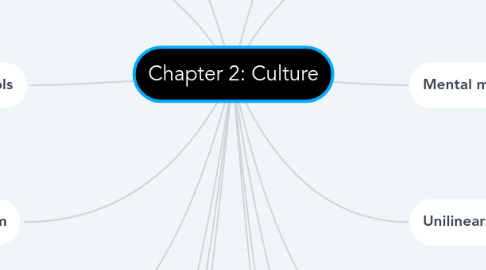Chapter 2: Culture
作者:Glenda Ancheta


1. Norms
1.1. what you wear in certain occasions
1.1.1. weddings/ funerals
1.1.1.1. school
1.1.1.1.1. work
1.2. how you should behave towards others
1.2.1. polite
2. Values
2.1. what makes it important
2.1.1. beliefs
2.1.1.1. good life
2.1.1.1.1. the truth and right
3. Symbols
3.1. art
3.2. politics
3.3. economics
4. Cultural relativism
4.1. understanding groups
4.1.1. beliefs
4.1.1.1. practices
5. Historical particularism
5.1. develop in specific ways
5.1.1. cultural diffusion
5.1.1.1. racial sterotyping
6. Power
6.1. stratification
6.2. action/influence
7. Hegemony
7.1. material power
7.1.1. political
7.1.1.1. military power
7.2. consent and agreement
8. Epigenetics
8.1. analysis gene in which someone is born
8.1.1. DNA
8.2. stress
8.3. social inequality
8.4. migration
9. Culture
9.1. beliefs
9.1.1. pattern of behavior
9.1.1.1. artifacts
9.2. learned by a group of people
10. Enculturation
10.1. religious
10.1.1. English class
10.1.1.1. family/friends
10.2. process of learning cultural
11. Mental maps of reality
11.1. cultural of what kinds of people and things exist
12. Unilinear cultural evolution
12.1. all cultures would evolve through the same sequences stages
12.1.1. savage
12.1.1.1. barbarian
12.1.1.1.1. civilized
13. Structural functionalism
13.1. internal balance
13.2. equilibrium
13.3. society
14. Thick description
14.1. deep cultural meanings
14.2. families for prestige
14.2.1. power
14.2.1.1. resources
14.3. interpretivist approach
15. Agency
15.1. norms
15.2. values
15.3. mental maps of reality
15.4. symbols
16. Human microbiome
16.1. genes
16.2. bodily functions
16.2.1. digestion
16.2.1.1. vitamin
16.2.1.1.1. immunity
